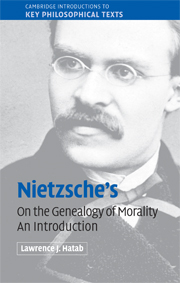Book contents
3 - The first essay
Published online by Cambridge University Press: 05 June 2012
Summary
The truth of the first essay is the psychology of Christianity: the birth of Christianity out of the spirit of ressentiment, not, as is believed, out of the “spirit” – a countermovement by its very nature, the great revolt against the rule of noble values.
(EH III, GM)A NEW HISTORY OF MORALITY (SECTIONS 1–3)
Nietzsche begins by retrieving his discussion of English psychologists in the Preface. He praises some of their qualities, especially their suspicious stance toward Christianity, Platonism, and moral idealism, as well as their courage in confronting undesirable truths about morality (1). Yet Nietzsche sets the stage for his own genealogical approach by claiming that these historians of morality are lacking in “historical spirit” (2). How so? For them, the origin of the term “good” is found in the usefulness of unegoistic acts, in the praise given by the beneficiaries of such acts. In time, however, this mundane instrumental origin was “forgotten” and selfless acts came to be deemed as intrinsically good. While Nietzsche can appreciate the “deflationary” effect of this treatment, he charges the English historians with missing another history that undermines their assumption that moral goodness is equivalent to the value of selfless acts and their benefits. They have not questioned the very value of this concept of morality in the context of its history.
In Section 2 Nietzsche initiates his alternative history of moral concepts.
- Type
- Chapter
- Information
- Nietzsche's 'On the Genealogy of Morality'An Introduction, pp. 37 - 68Publisher: Cambridge University PressPrint publication year: 2008

